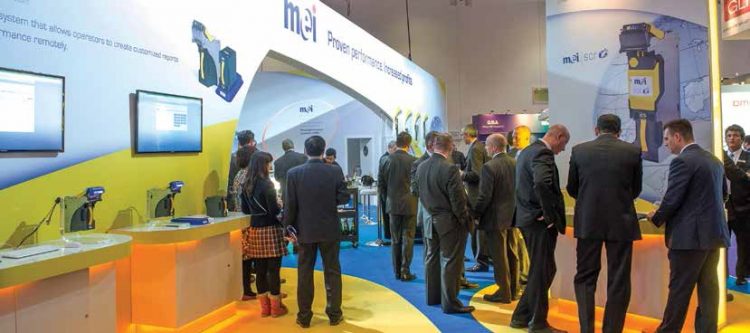Tom Nugent, Crane Payment Innovations’ president of Gaming and Retail, extols the virtues of being bigger and broader in the automated payment systems field
ast month’s ICE Totally Gaming expo in London witnessed the launch of a new brand promising the industry’s most comprehensive portfolio of cash management solutions for gaming, financial, retail, transport and vending markets.
Crane Payment Innovations, or CPI, was born of the recent acquisition of MEI by Crane Co., consolidating the note and coin products offered by MEI and Conlux, as well as Crane Payment Solutions’ Cashcode, Money Controls, NRI and Telequip brands.
“The MEI side is predominantly cash, currency, physical bills and notes, while CPS is primarily coin products,” explains Tom Nugent, CPI’s new president of Gaming and Retail—the position he formerly held at MEI. “By bringing those together, we’re able to offer our customers a portfolio of technologies and service all of their needs.”
“The combined knowledge of CPI allows us to offer customers the personnel, experience and products to find solutions that impact the bottom line,” adds Mr. Nugent. “And, ultimately, that is how we should be measured. We aspire to set a new standard—driving transaction, asset and maintenance efficiencies into customers’ operations.”
While mergers inevitably lead to speculation about removal of duplicate product lines across the two companies involved, Mr Nugent stresses that CPI’s inclination is to maintain a diversity of offerings. “We know there are some minor overlaps and we will take a hard look at that, but our mantra is ‘customers first; no customer left behind.’ So if somebody is enjoying a certain technology the last thing we want to do is take away something that works for their business. We put in a lot of effort to make sure our customers are satisfied with the technologies we’re bringing.”
The new entity will enjoy expanded capabilities, according to Mr Nugent. “My engineering team grows by 40%. Now we have the ability to develop new technologies together whereas perhaps we were previously both developing competing similar technologies. We’ll also have more capability on the sales side and the tech support side—the way we interface with our customers. We’re just broader and stronger.”
Whereas MEI was previously owned by private equity firms, “Now being owned by a public company and one that’s aggressively investing in this space is very exciting for us,” adds Mr Nugent. “If you look at what Crane has done and how many acquisitions they’ve made since 2006—this is the fourth one in this space—to have an owner that’s so committed to that space and willing to invest in it is incredibly exciting for the future.”
The merger will obviously add up to certain cost savings as well. “There are some redundancies,” acknowledges Mr Nugent. “There’s also the supply chain where we’re both buying technologies or materials, so now we have as a bigger company the ability to leverage our supply chain and leverage our capabilities in different locations. “Another thing is Crane and MEI both have physical offices in some places. In Las Vegas we have two different physical offices three miles apart. [In January] we brought those together. We’re doing the same thing in other locations. Australia is next. That gives you one location, you reduce some costs associated with that and bring the families together.”
Long Time Coming
The completion of the acquisition has been 24 months in the making from when MEI began to look for options for future development, which led to it forging a relationship with Crane Co. Although Crane had originally announced its intent to acquire MEI on 12th December 2012, the process was held back by the European Commission’s request that two CPS products first be divested in order to avoid the formation of monopolies following the merger. Neither of the divested products were in gaming.

Although Mr Nugent is excited about what CPI will be able to offer customers, he points out, “Our challenge, in the immediate future, is to temper the enthusiasm of what can be with the realism of what needs to happen to provide the level of service customers have associated with these brands.”
It’s a work in progress, and the new entity will begin to take shape as corporate and customer-facing functions are consolidated. CPI emphasizes that until core functions can be assimilated in a manner that is seamless to customers, it intends to have CPS and MEI act as separate companies in a “business as usual” state.
In Asia, the MEI and CPS brands have distinct followings. “MEI does very well in Macau on the traditional casino side, whereas in Australia, where there’s still a lot of coins usage, you have a lot of Crane influence there,” says Mr Nugent, adding, “And in the Philippines, Crane has a presence in the bingo markets while MEI has the casino presence. So we’re able now to service customers however they grow.
” Meanwhile, MEI has been growing share in several key Asian jurisdictions, notably Macau, “where it used to be a one-competitor market; now it’s a two-competitor market. And that’s good for our customers because they have a choice, versus in the old days when it was just the other guy.”
“Asia remains a very important market for us,” continues Mr Nugent. “I spend quite a bit of time there and we have local teams in each of the countries. We know that Asian gaming continues to grow. We will continue to put additional resources there and look forward to all the new exciting developments.”




























